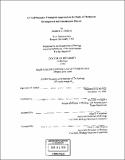A T cell receptor transgenic approach to the study of thymocyte development and autoimmune disease
Author(s)
Delaney, Joseph R. C. (Joseph Robert Clarke), 1969-
DownloadFull printable version (12.15Mb)
Advisor
Susumu Tonegawa.
Terms of use
Metadata
Show full item recordAbstract
CDS+ T lymphocytes recognize short peptide fragments when bound to self-class I major histocompatibility proteins. On a mature lymphocyte, such recognition results in activation of the T cell. On an immature thymocyte, such recognition may result in either positive selection, allowing the cell to mature, or negative selection, eliminating that T cell clone from the host's repertoire. The parameters that determine thymocyte fate have remained unclear. An experimental study was carried out to determine these parameters. A variety of peptide ligands were tested for their influence on the positive and negative selection of T cell receptor-transgenic thymocytes. It was found that peptides with limited amino-acid sequence homology and vastly different affinity values for the T cell receptor could promote positive and negative selection of T cells in a dose dependent manner. It was found that the outcome of selection was also influenced by the type of antigen presenting cell present. The levels of surface expression of class I MHC proteins was significantly different on these cells types and correlated with their physiological roles in positive and negative selection. Mice that co-express a transgenic T cell receptor and a cognate-ligand developed an autoimmune disease, the pathology of which was reminiscent of psoriasis. The disease was strictly dependent on the presence of both the T cell receptor and antigen. Interestingly, only certain inbred strains of mice developed the disease. The phenotype of transgenic cells differed from affected to unaffected animals. Analysis of these mice could reveal novel genetic factors that influence T cell responses. Furthermore, these mice may also develop into a useful model for human autoimmune psoriasis or other disorders of the skin.
Description
Thesis (Ph.D.)--Massachusetts Institute of Technology, Dept. of Biology, 1999. Vita. Includes bibliographical references (p. 158-179).
Date issued
1999Department
Massachusetts Institute of Technology. Department of BiologyPublisher
Massachusetts Institute of Technology
Keywords
Biology